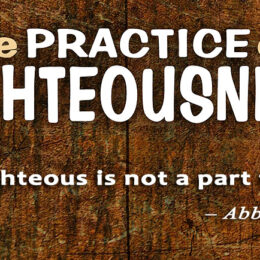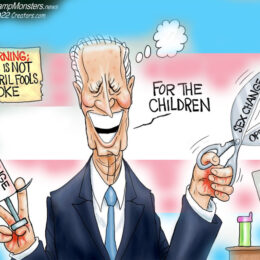12/15/2010 – John Hayward –
Socialist politics are based around the need to provide for the less fortunate, whose misfortune is entirely beyond their control. They’re either victims of a merciless system that won’t let them get ahead, or the hapless prey of the Evil Rich. Part of this mindset involves an essential disdain for the capabilities of lower-class individuals. The idea of elevating them by providing opportunity is dismissed as a smokescreen deployed by greedy fat-cats and their paid minions. The poor must be guided and cared for.
Since the poor cannot take care of their own needs, and the benevolence of greedy citizens is unreliable, the power of the State must be deployed on their behalf. Initially, this takes the form of relatively modest welfare programs, but it soon expands into the system of tax-and-spend liberalism we recognize today. The State appropriates huge sums of money from the upper and middle class, to fund various programs for selected constituencies, who reward the socialist with their loyal votes.
The next step is income redistribution, which comes with the concept of punitive taxation. The upper echelon of taxpayers is not merely asked to provide necessary funds for carefully managed welfare programs; they are meant to suffer from the seizure of their income. Any resistance to the seizure of income is a sign of sinister and inexcusable greed, as they seek to evade their righteous punishment.
Take a moment to tour the more energetic liberal websites, and you’ll see the indisputable truth of this observation. High-income taxpayers pay a disproportionate share of our total income tax burden – the top 1% of income earners pay about 37% of the total tax burden, while the top 5% pay almost 60%. They are not thanked for covering the lion’s share of taxes… far from it. They are hated and despised, except for loyal and visible members of the Party, of course.
Why would that be, if the purpose of liberal politics is to take care of the poor and downtrodden? If the programs designed to assist the poor are receiving adequate funding, why would the compassionate leftist be angry at those who provide the funding, for the crime of resisting an effort to appropriate more of their income?
Compassion without reason is helpless grief.
The truth is that Democrat Party politics long ago ceased to be about caring for the downtrodden, although the Party agenda is always cloaked in compassionate language. Look at ObamaCare, sold during its early, vulnerable stages as an urgent program to bring health insurance benefits to an ever-changing number of uninsured Americans – it could be 15 million, 30 million, or 47 million, depending on how recently someone pointed out the higher numbers included illegal aliens. However, the Democrat proposal did not involve taxing everyone else to provide some kind of welfare benefit for the uninsured. Instead, it was a trillion-dollar takeover of the entire industry… and now, after a year of crushing job losses and economic shrapnel from the detonation of hidden clauses in the massive ObamaCare bill, we have more people uninsured than ever. The Heritage Foundation estimates that 41 percent of Americans will be uninsured by 2019 because of ObamaCare, and 17 million Americans have lost employer-provided health care coverage. Every week brings a new story of employers dropping policies, benefits being cut back, and new waivers granted to exempt favored corporations and unions from the whole mess.
Compassion without reason is helpless grief. Reason tells us that the charity of a prosperous nation is more useful to the poor than the hollow promises of unsustainable socialism… and opportunity is better still than charity. Our social status is not fixed. People move between the lower, middle, and upper classes throughout their lives. A lot of people who make over $200k per year, becoming Evil Rich targets of class hatred, spent years of hard work at lower income levels to get there. Freedom and opportunity enable that movement. Welfare without opportunity becomes quicksand.
A political Party that professes to allocate resources based on need will always become corrupt, because too much power lies in deciding whose needs matter the most, or which ambitions should be dismissed as sinful greed.
A political Party that professes to allocate resources based on need will always become corrupt, because too much power lies in deciding whose needs matter the most, or which ambitions should be dismissed as sinful greed.
The downtrodden people of an advanced society are helped most by strong and confident middle and upper classes that see to their own needs, not a morose population of dependents, floating face-down in a pool of high unemployment. The fruits of industry and innovation make a huge difference in the lives of the poor – it’s better to be lower-class in 2010 than upper-class in 1910. The benefits of free individuals seeking each other out, through both commerce and charity, are greater than clumsy, top-down statist programs that would only be considered failures if they requested less money in next year’s budget.
If you want to help the poor, contract the State that does so much to prevent them from becoming anything else. If you want to raise up the downtrodden, stop treading on them. Faith in the State demands suspicion of your fellow citizens. The expensive failures of the State increase the amount of faith necessary to give it another try… and sharpen suspicion into hatred. What better way to describe the moment the Democrat Party has reached?
HT: Human Events




The policies that would help the poor become prosperous are anathema to politicians and bureaucrats. Let me illustrate with real life. (I work as a Case Manager in a “Welfare to Work” program, so I see the evils of bureaucracy first hand on a daily basis.)
Poor people on the dole are forbidden at every turn to do simple, common-sense approaches to financial independence. They’re given little cash, but extravagant amounts of money for food stamps. Many food-stamp recipients want to start small catering businesses, using their food stamps as capital. (They often do it small scale but if they ever got caught, they’d be in trouble, so they dare not expand.) So a woman who sells the occasional plate of food to neighbors, providing a wanted service, increasing her own income and independence, is looking over her shoulder to make sure she doesn’t get caught breaking the rules against “running a business” out of her subsidized housing (she can’t braid hair, tutor neighborhood kids, fix small appliances, or sell arts and crafts, either.). She’s not allowed to use the food stamps for financial gain. She’s not allowed to sell food without licensing and inspection. If she is honest and reports the income, God alone knows how many government entities will come in and crush her. So though she by far would prefer to OPENLY and LEGALLY operate a small business, she’s hemmed in. Instead of encouraging her entrepreneurial spirit, every government entity with which she has contact is, she knows full well, just watching for evidence of initiative and resourcefulness so they can punish it.
Would it not make more sense to guide her, rather than punish her? To say, “Here is how you report this income” — thus reducing the amount of public subsidy she gets? To treat small out-of-home meal services more like a bake sale and less like a restaurant? (If her neighbors know and trust her, do they really need government inspectors to protect them from her? If they’re willing to forgo this protection, voluntarily, in exchange for the convenience, or the preferred cooking style, why is protection mandated?
Would it not make more sense to create easy ways for her to report her income and pay appropriate taxes on it?
And let’s not even go near the onerous worker’s comp and OSHA and minimum wage and other bureaucratic barriers to laborers who want to sell their labor on the open market. There IS no open market for one’s own labor.
We create a system that makes it very difficult to escape poverty, then scorn the people for remaining poor.